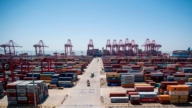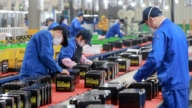【新唐人2012年8月21日讯】希腊等欧盟国家发生欧债危机至今,中国资本加速翻倍的对欧洲国家展开投资。就投资策略来说,这不失为一个利机。但,与此同时,外界担心长此下去,欧洲经济会过于依赖中国,而中共背后却隐藏着其他动机。
《法国国际广播电台》引用法国地缘政治学博士皮埃尔•比卡尔的文章说,据并不完全的统计数字,最近三年来,中国对外投资中,对欧洲的比例,从原先的百分之二上升到百分之十。除了德国和英国,中国在荷兰、比利时、希腊以及东欧的投资也不断攀升。投资标的多为各国各自的强项。
这篇题为“中国如何利用危机购买欧洲的企业”文章中还说,尽管中国在欧洲的投资专案中,成功的案例就目前而言几乎屈指可数,但,这仅仅是个开始。
“北京大学经济学院”教授夏业良指出,从过去几十年的经验观察,中共对外的投资基本上没有多少收益。
“北京大学经济学院”教授 夏业良:“亏本、破产啊,这种情况比比皆是。所以很难说中国这个投资完全出于经济目地,就是很大的情况下,他们的投资都带有很强的政治目地,就是说,希望能够强化中国在欧洲的影响,也希望通过投资能够对有些领域、对(当地)政府、甚至对老百姓,产生一种心理上的一种影响。”
中共总理温家宝去年在“第五届夏季达沃斯论坛”上声称,中国至今相信欧洲经济能够克服困难,中国仍然愿意扩大对欧洲的投资。
与此同时,中国企业正试图投资或收购欧洲各国基建、技术和名牌商品。
中国资金为欧洲带来就业机会,刺激欧洲的经济增长,但舆论界对此越来越感到质疑。
美“南卡罗莱纳大学艾肯商学院”教授 谢田:“中国的资本老有这个问题,就是说,有很多西方人是分不清这到底是民间的资本﹔还是国家的资本,是不是有中共政权在背后。如果有中共政权在背后,他们就担心会有政治上的因素,政治上的目地在背后,所以,他就会有所顾虑。”
皮埃尔•比卡尔认为,中国的投资可以拯救欧洲濒临倒闭的企业,也避免职工陷入失业的处境。而中共总理温家宝也表示,中国愿意扩大对欧洲投资的同时,也表态,希望欧洲一些主要国家的领导人,承认中国完全市场经济地位。
夏业良:“中国现在老是用国家作为主体,来取代企业和个人去投资,那这样的做法实际上就是一种把资源垄断,然后更加突显它的国家主义的取向,不是搞市场经济的做法。”
除此之外,美国“南卡罗莱纳大学艾肯商学院”教授谢田指出,中共更希望获得欧洲的军事科技,放松欧洲军火对中国出口的限制。
谢田:“还一点就是,中共在国际上饱受人权的压力,就是西欧各国对中共的人权上去批评,它认为希望透过投资来缓解压力,所以,中共确实是在赚钱的目地之后,有其他背后的隐藏的动机在里面。但是,西方人也不是不知道,所以实际上,真正高科技的军火东西,他也不卖给中共。”
报导还说,虽然欧洲各国的政界和企业界,对中国的投资作出热情的回应,但外界担心,长此下去,欧洲经济会过于依赖中国。
谢田:“真正要影响,就是操控欧洲的经济,这还差得很远很远。虽然对中国来说,这是占中国对外投资很大的一部分,但实际上总数来说,那还是非常非常少。它还远远不到日本的资本或南韩的资本对欧洲投资的那个规模。”
谢田指出,中国的资本流向欧洲,也说明中国的投资环境正在急剧的恶化。
采访编辑/梁欣 后制/萧宇
Suspicion Over Influx of Chinese Investment in Europe During Debt Crisis.
SInce Greece and other EU countries faced debt crisis,
Chinese capital invested has doubled in European countries.
In terms of investment strategies,
this would be a favorable opportunity.
However, at the same time, overseas media fear
that if this continues, the European economy could become too dependent on China.
Other motives could become hidden
behind the Chinese Communist Party (CCP).
“Radio France Internationale" reported in an article
by Dr. Pierre Bikar that according to incomplete statistics,
in the last three years, Chinese foreign investment
in Europe has risen from two percent to ten percent.
In addition to Germany and the United Kingdom,
investment in the Netherlands, Belgium, Greece, and Eastern Europe is growing.
The investment targets almost reflect
the respective strengths of each country.
The article, entitled “how to take advantage
of the crisis to buy European enterprises" also said
that in the opinion of Chinese investment professionals
in Europe, you should buy now.
There are only a few success cases to date,
but this is just the beginning, it said.
Xia Yeliang, a professor at the School of Economics
at Peking University commented.
In observing the past few decades, CCP foreign
investments have brought little return in revenue.
Xia Yeliang: “Loss and bankruptcy
cases can be found everywhere.
So it is hard to say that these kind of Chinese
investments are entirely for economic purposes.
In many cases, these investments
are with strong political purpose.
The CCP doesn’t only wants to be able
to strengthen China’s influence in Europe.
It also hope that by their investing in some areas
of the (local) government, or even in people, it can produce a psychological impact.”
Last year, at the 5th Summer Davos Forum,
CCP Premier Wen Jiabao claimed that
Chinese believed that so far, investing in the European
economy would overcome the financial difficulties.
China was still willing to expand investment in Europe.
At the same time, Chinese companies are trying
to invest in or acquire European infrastructure, technology and brand-name goods.
Chinese capital has created employment opportunities.
It has stimulated economic growth for Europe,
but media are starting to question this more and more.
Prof. Xie Tian, University of South Carolina Aiken Business
School, U.S.: “China’s capital always has this problem.
In other words, there are many Westerners who,
in the end, cannot tell the difference between
private sector capital and the country’s capital,
or whether the Chinese Communist regime is behind it.
If the Chinese Communist regime was behind it,
they are worried that it has political motivations.
So, they would have concerns.”
Pierre Bikar thinks that Chinese investment will not only
save European enterprises from the brink of collapse.
It will also help workers avoid unemployment.
CCP Premier Wen Jiabao said that China
is willing to expand its European investment.
At the same time, it also hopes the leaders
of some major European countries recognize China’s full market economy status.
Professor Xia Yeliang: “The CCP always now
uses the Chinese state as the main body investment.
This is instead of businesses and individuals.
Actually, it is a resource monopoly, giving more
prominence to its nationalist orientation.
It does not engage in the practices of a full market economy.
In addition, Professor Xie Tian highlights that the CCP
hopes to obtain military technology from Europe.
It has relaxed restrictions in exporting
arms from Europe to China.
Xie Tian: “The point is that the CCP is under pressure
from the international community for it’s human rights.
The countries of Western Europe
are critical of the CCP’s human rights.
The CCP diverts this pressure through economic investment.
Therefore, the CCP certainly has other hidden
motives behind it, aside from making money.
However, Westerners actually know this,
so it won’t sell it’s real high-tech arms to the CCP.”
The report also said that European political and the business
circles made enthusiastic responses towards the investment.
But international media fear that the European economy
will become too dependent on China longer term.
Xie Tian: “The CCP is not yet at the point of truly
influencing or manipulating the European economy.
As far as China is concerned, this is a large
part of total foreign investment from China.
But in fact, its total amount is very, very small.
The scale is also far less than the capital investment
of Japan or South Korea in Europe.”
Xie Tian points out that China’s capital flowed to Europe,
which also demonstrated that China’s investment environment is being sharply deteriorated.



























